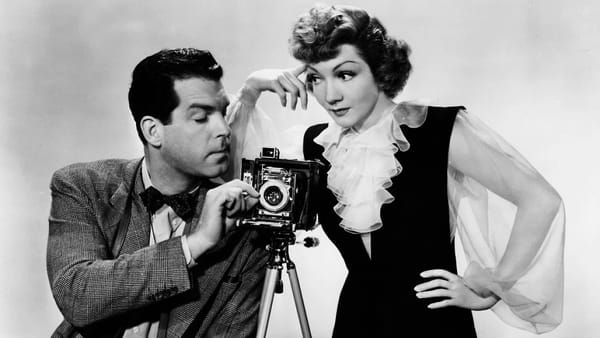God Help Us

Several recent attempts to deconstruct American megachurches and televangelists fail to grasp what truly makes institutionalised evangelicalism so insidious
One glance at the news can provide an immediate insight as to why American society is currently living in decidedly faithless times. In the wake of a pandemic that has ravaged the world, a climate crisis to which complicit politicians remain largely apathetic, and an economic sense of downward mobility that seems to grow worse with each new generation, the powerlessness of the average citizen provides an easy, if partial, explanation as to why aggregate belief in a divine path has steadily declined in the past decade. Additionally, the advent of the Internet has allowed otherwise isolated Americans access to perspectives that scrutinise the government’s reliance on Christian doctrine, offering an online space for community and introspection in rural or highly religious areas where there otherwise would be none.
Pearl-clutching backlash from conservatives in response to anything remotely liberal is nothing new. But this increased pessimism towards the concept of a higher power has caused conservative talking heads across the United States — the majority of whom hold political beliefs in accordance with their supposedly Christian faith — to heighten their usual fear mongering in the past few years, using this general lack of belief as another tool in their arsenal in the unending culture wars. This has extended to the actual ballot box as well, as politicians on both state and federal levels have fought desperately to maintain an appearance of partisan strength through voting regulations designed specifically to manipulate the odds in their favour.
The gulf between the supposed old guard of conservatism and a more liberal, less repentant general population has led to an influx of popular cultural objects which do not simply take aim at reactionary outrage, but capitalise on it to increase word of mouth. In the past two years alone, two of the biggest hit songs in the country owed a considerable amount of their success to baiting controversy over regressive ideas about sexuality ingrained in Christian culture: Lil Nas X’s “Montero (Call Me By Your Name)” famously premiered with a music video depicting the viral-sensation-turned-pop-star giving the devil a lap dance in a defiant proclamation of his gay identity, and Cardi B and Megan Thee Stallion’s “WAP” flaunted its celebration of the female orgasm through a series of gleefully ribald punchlines. (When met with hysterically aghast reactions from some online voices, Megan Thee Stallion later went on to provide a glorious rebuttal in the form of the music video for her song “Thot Shit,” which follows Megan and her posse finding new and hilarious ways to humiliate a pathetic politician.)
The film industry too has proven fascinated with the dying gasps of cultural evangelicalism, more specifically in how the gospel is spread through the now-prominent phenomenon of megachurches and televangelists in the media. The films Honk For Jesus. Save Your Soul. and The Eyes of Tammy Faye, as well as the television show The Righteous Gemstones, are all concerned with the scandals and even criminal entanglements of heavyweights in Christian media — some of whom, in the case of The Eyes of Tammy Faye, are based on real public figures. Though all three works have been greeted with varying levels of success, that The Eyes of Tammy Faye nabbed Jessica Chastain an Academy Award for Best Actress suggests that there is an interest, however self-congratulatory, for films that purport to examine how the trappings of Christianity stifle one’s sense of self to a suffocating degree. Despite the nobility of that aim, however, all three leave something to be desired in their execution, none of them able to truly pin down what makes evangelicalism such a corrosive yet powerful presence in the American psyche.
The most recent of these efforts, Honk For Jesus. Save Your Soul., a selection from the 2022 Sundance Film Festival, also saw the most humble release, appearing in American theatres for a couple of weeks while simultaneously sent to languish on NBC’s streaming service Peacock. However, Honk For Jesus has loftier ambitions than its unceremonious release strategy would suggest, as the most topical of all the titles mentioned thus far. Framed as a mockumentary, the film follows pastor Lee-Curtis Childs (Sterling K. Brown) and his wife Trinitie (Regina Hall) as they attempt to rebuild their Black megachurch in the wake of sexual assault allegations against Lee-Curtis made by a handful of young men, the bulk of whom were teenagers when the alleged incidents took place. Set in Atlanta, Georgia, the film is based on real-life events that took place in 2010 and knowingly calls attention to the wider sexual abuse crisis by Southern Baptist leaders currently under investigation.
By centering the perspective of Childs’ wife, the film opens itself up to the possibility of examining how her sense of self unravels in the wake of learning that her marriage — the culmination of a woman’s place in Christian doctrine — and by extension her career, was built on lies, and how she copes with that awakening while trying to establish a genuine sense of identity for herself. Indeed, some scenes showing Trinitie go about her day in her own company do illuminate just how much of her self-esteem is dependent upon performing the role of an obedient wife for the couple’s congregation. A devastating sequence at the local mall makes that painfully clear, showing her strike up a conversation with a woman who can see through her fragile façade. The film’s mockumentary framework, however, is only used to its most shallow abilities, taking aim at the couple’s failed attempts at discretion and at their vain efforts to keep the peace in their marriage. Scenes depicting gritted teeth and reassuring platitudes resonate less and less with each subsequent revelation.
The bulk of the film is dedicated to comedic gags that poke fun at the supposed hypocrisy of its characters, pointing out again and again the absurd contrast between the ostentatious nature of their church and presentation, and the biblical principles of equity and generosity that they conveniently pervert. The couple’s embrace of so-called “prosperity gospel,” or the belief that God empowers His followers who spread His Word by rewarding them with excess wealth, does result in some amusing jokes; Sterling K. Brown’s command of his character’s arrogance makes his more conceited lines land with the right amount of outlandishness, and Regina Hall’s quiet condescension — a hallmark of Southern Baptist culture — is lent a refreshing sense of dimension by her palpable charisma as a performer.
The choice of a comedy register through which to address and highlight the characters’ increasingly ineffective coping mechanisms makes sense. However, in attempting to straddle both comedy and drama, the film hampers its understanding of both aspects of this saga, playing it safe with the jokes and pushing to the periphery the emotional stakes of the story — as well as the severity of Lee-Curtis’s traumatising behaviour. Ultimately, the fundamental flaw here is an ambition upon which the film can’t truly deliver. Starting from an already very bleak premise about two people forced to repress their true desires for the sake of maintaining an image of Christian purity, Honk for Jesus. chooses not to go further into emotionally heavy territory and, instead of tackling the root of those problems — the ossified gender roles at the heart of evangelical doctrine — deflects into easy humour and provides its story with a neat ending.
Yet even that conceptual misfire has more innovative ideas than its much more successful thematic predecessor, The Eyes of Tammy Faye, a disastrous attempt to humanise a real figure who has been playfully reduced to a caricature since her ascendancy. Based on the real saga of Jim and Tammy Faye Bakker, a married pair of televangelists who rose to prominence in the 1980s at the forefront of the Christian television empire, The Eyes of Tammy Faye depicts Jim Bakker’s fall from grace — like his fictional successor Lee-Curtis Childs, he is accused of being both a closeted gay man and a rapist — from the perspective of his wife. At the same time, she is ostracised by their community of fellow pastors for her attempts to blend their ministry with a more progressive view of oppressed peoples, most notably gay men in the time of the AIDS crisis.
Much has been made of the decision to coat Jessica Chastain in several layers of prosthetics and makeup in order to achieve further resemblance to Tammy Faye. Combined with Chastain’s gratingly overdone Midwestern accent and mannerisms, the effect is indeed truly unsettling and only adds to the artifice of her abysmal performance, a pantomime of her character’s own emotions that never grounds itself in anything real if the opportunity to priss and pout is presented instead. Yet the makeup isn’t the only way the film attempts and fails to take aim at the inherent hollowness of performing an image of saintly subordinance for money. With nearly every other line of dialogue, God’s presence is referenced in thuddingly on-the-nose fashion, solidifying the impression of a film choosing to abandon any sense of subtlety whenever possible.
It’s no coincidence that both The Eyes of Tammy Faye and Honk For Jesus. Save Your Soul. attempt to examine the evangelical mindset through a woman’s viewpoint: where the Bible implores that men serve as the head of the house, enabling the patriarchal doctrine that allows men to effectively get away with anything they pursue in the name of their own gratification, a woman is not only superseded by the will of God, but by her own husband, placing a hierarchy on even the most intimate of relationships. This bind is inherently fascinating, especially for a character portrait. But like the protagonist of Honk For Jesus. Save Your Soul., Tammy Faye in this film is rarely portrayed as anything other than a passive victim of circumstance. Though she is occasionally the subject of fleeting moments of empowerment — perhaps most notably in a scene during which she stands up for AIDS patients at a dinner party — these examples are presented as distinct exceptions to the rule. Her portrayal as a drug addict is ostensibly interested in deconstructing these roles, yet by relying on stereotypes of shrill, emotional wrecks of repressed women, the critique focuses more on making a condescending cautionary tale of Tammy Faye’s personal life than on understanding the cultural factors that brought her to such a tragic fall.
That framing of women as innately powerless in both films not only nullifies the stakes of their drama; it also betrays a conventional and uncritical understanding of marriage, one which allows both films to benefit from tired tropes and to avoid investigating the wives’ complicity in their own dynasties any further. Only ever flirting with the idea of these women questioning their place, both films are too frightened and uncommitted to explicitly admit that these wives are suffering as a direct consequence of their roles in evangelical doctrine.
Furthermore, aside from its insulting understanding of gender roles, what causes The Eyes of Tammy Faye to become so politically impotent is its fundamental flattening of the factors that result in the Bakkers’ Praise the Lord Club program to be so overwhelmed by greed. The film frames Tammy Faye’s support of the couple’s transition to television as a consequence of her not being allowed to attend church services as a child; more than anything, she is presented as a generous woman who is motivated by a desire to give children with rural backgrounds like hers access to the gospel wherever they live. The film depicts the couple’s gradual failure as primarily a result of Jim’s deceitful nature, and while that certainly played a role in their downfall, this insistence on framing him as an antagonistic force distracts from the fundamental conflict between the Christian belief in equality and the need for constant financial growth and expansion under capitalism — a conflict that is only nebulously touched upon through Jim’s preposterous idea for a “Christian water park” about two-thirds into the film’s runtime.
A narrative with a much better grasp of this divide is The Righteous Gemstones, an HBO series that initially premiered in 2019 and similarly follows a family of televangelists, including a late mother figure whose fascination with music and puppetry is explicitly modelled on the likeness of Tammy Faye Bakker. The show is easily the best of the recent wave of evangelical stories to appear in pop culture, thanks to its unabashed willingness to embrace the grotesque nature of its characters with often hilarious precision. The brainchild of producer and screenwriter Danny McBride, who also stars in the show, The Righteous Gemstones is the latest entry in his filmography (which also includes shows such as Eastbound and Down and Vice Principals) to concern itself with the whims of men whose hypermasculinity is their tragicomic weakness.
Unlike its feature-length contemporaries, The Righteous Gemstones makes no attempts to disguise the amorality of its characters, who are depicted as crude, greedy and immature. At once shockingly petty and particularly hare-brained in executing any legitimate schemes, they also get involved in actual criminal activity, such as routine money laundering. In other words, the Gemstone family are exactly the type of people who would utter a string of profanity only to punctuate it with interjections praising the Lord. (One such line from the show: “Get the door! I’m praying, goddamnit!”) The show is worth watching for its understanding of quaintly verbose Southern Baptist cadences and mannerisms alone, which is often uproariously funny and perceptive and likely due to McBride’s familiarity with the subject matter, having been born in Georgia and raised in Virginia. This isn’t to say that the show is perfect — without higher stakes to put such inept characters under pressure, some of the show’s jokes can become stale — but it tells a solid self-contained story and understands the motivations of its characters, without feeling obligated to defend their decisions.
However, as an examination of evangelical culture, The Righteous Gemstones still leaves a bit to be desired, namely in the way it frames its characters as being uniquely awful in their composure. Even if their business is constantly skewered as being transparently opportunistic in the script, that the Gemstones’ services so consistently draw a crowd of genuine believers does beg the question of what their congregants actually believe in, as well as how those beliefs may influence their daily conduct. The family’s most nefarious deeds are kept under wraps, sure, but the employees they attract and the chauvinism they display in their sermons — to say nothing of the colonialist lens through which they practise missionary work — do provide some indication of their true character, and the fact that thousands of people could regularly buy into such ideas reveals an unsettling subtext that remains so far unexplored. Like the Gemstones themselves, their followers are probably cloaking their own dire transgressions in an air of sanctimony, but the show is ultimately too closely bound to its lighthearted framework to ever explicitly address this question.
This omission underscores what makes all of these examples ultimately flimsy in the context of the actual evangelical environment in which they take place and are being released. In an era during which Republican politicians are increasingly campaigning for an open embrace of Christian nationalism within the party, conservative lawmakers and judicial figures have orchestrated the reversal of Roe v. Wade, as well as a wealth of attacks on queer and trans youth across several U.S. states, which have a strong possibility of expanding to a federal level. Rather than embrace people from all walks of life and protect their right to health and human rights, conservatives who justify their actions with evangelical rhetoric have adopted cruelty as the very point of their decisions, without any regard for how this reflects on their modelling of godly behaviour. Relying on the Christian hegemony that has spread to even the secular segments of the country thanks to centuries of genocide and persecution, Republican lawmakers are brandishing their supposed Christian values as excuses to subjugate entire groups of people and feel morally righteous as they do so — a rhetoric that has allowed and will continue to allow oppression and fascism to thrive in this country.
Satires that merely seek to poke fun at the so-called hypocrisy of such people not only fail to comprehend how these figures understand the role of religion in their lives, but reveal themselves as entirely self-serving. By taking a shallow approach to their topics at hand, these works ultimately serve as a distancing mechanism between audience and subject matter, as if to pat the viewer on the back for acknowledging just how silly and ridiculous these people look. Films like Honk For Jesus. Save Your Soul. and The Eyes of Tammy Faye, as well as formidable television shows like The Righteous Gemstones do not only take an intellectually lax, unchallenging approach to their characters. They also misunderstand the seriousness of such figures’ real-life counterparts and the damage their rhetoric can actually inflict. Art should never be framed as the cause for societal ills — that idea itself is a regressive talking point often utilised by conservatives — but when the stakes are so high and the reality so grim, it is fair to argue that narrative half-measures have overstayed their welcome.



